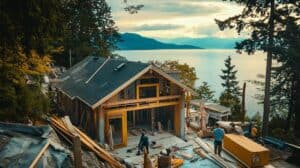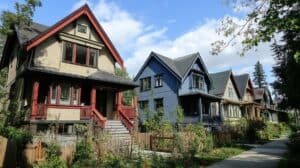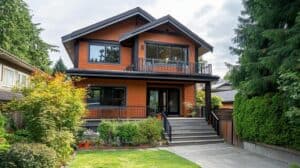If you’re thinking about renovating your home in Vancouver, the first question you’re likely asking is: How long will it take? The answer depends on a lot of factors—project complexity, local regulations, and even the availability of tradespeople. In this post, I’ll break down what you need to know, from permits to timelines, so you can plan properly and avoid common delays. Ready to get realistic about your timeline? Let’s dive in!
Overview of Home Renovations in Vancouver
Home renovations in Vancouver are a common undertaking for homeowners looking to improve their living spaces. The city’s diverse housing stock, ranging from century-old homes to modern condos, offers a wide range of renovation possibilities. However, timelines for these projects can vary significantly. The scope of the renovation, local regulations, and availability of materials all play a role in determining how long a project will take.

In Vancouver, external factors like weather conditions or neighborhood-specific bylaws can also impact the renovation schedule. For instance, projects that involve exterior work may face delays during the rainy season, while homes in heritage areas may require additional approvals. These variables make it essential to plan carefully.
Proper planning is key to a successful renovation. Homeowners should ensure they have a clear vision, a realistic budget, and a well-thought-out timeline. Early consultations with contractors and designers are crucial to avoid unexpected delays. By anticipating potential challenges, homeowners can streamline the renovation process and minimize disruptions.
Understanding Local Regulations and Permits
In Vancouver, obtaining the proper permits is essential for most home renovations. Whether you’re remodeling a kitchen or adding a new room, permits ensure that your project complies with safety standards and local regulations. The type of permit required depends on the scope of the renovation. For example, electrical work, plumbing modifications, and structural changes each require specific permits.
Local bylaws and zoning regulations also play a significant role in the renovation process. Zoning laws dictate what types of modifications are allowed in certain areas. For instance, some neighborhoods may restrict the height of new structures or the distance between buildings. These rules can affect the timeline of your project, as you may need to adjust your plans to meet local requirements.

Common permits in Vancouver include electrical permits for rewiring, plumbing permits for bathroom or kitchen upgrades, and structural permits for major alterations like removing walls or adding extensions. Failing to secure the correct permits can result in fines or delays, so it’s crucial to understand which permits apply to your specific renovation.
Planning Your Renovation
Creating a realistic renovation plan is crucial to ensure a smooth process. Below are key steps to help guide you through planning your renovation effectively.
1. Set a Clear Budget
Start by establishing a realistic budget. This will serve as a guide for all decisions throughout the renovation. Be sure to account for:
- Materials: Flooring, paint, fixtures, etc.
- Labor: Contractor fees, subcontractors, etc.
- Permits: Ensure you budget for any necessary legal permits.
Having a well-thought-out budget will help prevent overspending and keep your project on track.
2. Establish a Timeline
Once your budget is in place, the next step is to create a timeline. Keep in mind that renovations often face delays. Factors such as:
- Weather conditions
- Supply chain issues
- Unforeseen structural problems
It’s crucial to remain flexible. Planning for unexpected setbacks will reduce stress and keep the project moving forward.
3. Consult with Professionals
Consulting with contractors and designers early in the process is essential. These professionals can provide:
- Feasibility assessments: Can your vision be realistically achieved?
- Cost estimates: Are your ideas within budget?
- Design insights: Will your renovation align with the existing structure?
Early discussions will ensure that your vision aligns with both your budget and timeline.
4. Choose the Right Renovation Style
When deciding on a renovation style, consider two key factors:
- Architecture: Does the style suit the existing structure of your home? For example, a modern renovation may not complement an older, traditional house.
- Personal needs: For a growing family, functionality might take precedence over aesthetics.
Choosing a style that balances both the home’s architecture and your personal needs will lead to a more cohesive and satisfying result.
Conclusion
By following these steps—setting a budget, establishing a timeline, consulting professionals, and selecting the right style—you’ll create a solid foundation for a successful renovation. Planning ahead will help you avoid common pitfalls and ensure the project meets your expectations.
Factors That Affect Renovation Timelines
Several factors can significantly impact the duration of a home renovation project in Vancouver. One of the most critical is the complexity of the project itself. For example, a simple kitchen remodel will generally take far less time than a full home renovation. Kitchens may involve cabinetry, countertops, and appliances, while a full home remodel could require structural changes, plumbing, and electrical work.
The availability of labor and skilled tradespeople is another key factor. Vancouver has a high demand for construction professionals, which can lead to scheduling delays. If your project requires specialized trades like electricians or plumbers, finding available professionals can extend your timeline.
Material choices also play a role. Custom or imported materials may have longer lead times. Supply chain disruptions, which have become more common in recent years, can further delay the arrival of essential items like tiles, fixtures, or flooring.
Lastly, making changes during the renovation process can add significant time. Even small adjustments to the original plan can cause delays, as contractors may need to reorder materials or reschedule work. This is why sticking to the initial plan is crucial for keeping the project on track.
Common Renovation Projects and Their Typical Durations
Home renovations in Vancouver vary widely in scope, and so do their timelines. Some projects are quick, while others require months of work. Below are some common types of renovations and their typical durations.
Kitchen Renovations (6-12 Weeks)
Kitchen remodels are among the most popular projects. A basic remodel with new cabinets and countertops may take around 6 weeks. However, a more complex renovation involving structural changes and custom designs can extend the timeline to 12 weeks or more. Factors like custom cabinetry or high-end appliances can also introduce delays.
Bathroom Remodels (4-8 Weeks)
Bathroom renovations usually take between 4 to 8 weeks. Small bathrooms with minimal changes, such as new fixtures and tiles, can be completed in a month. Larger bathrooms with custom showers, heated floors, or complex plumbing adjustments may push the timeline closer to 8 weeks. Availability of specialized trades, such as plumbers, can also affect the schedule.
Full Home Renovations (6 Months to 1 Year)
A full home renovation is a significant undertaking. These projects typically last anywhere from 6 months to a year, depending on the size of the home and the extent of the work. Structural changes, such as adding new rooms or altering the layout, can stretch the timeline. Additionally, older homes in Vancouver may require updates to electrical or plumbing systems, adding extra time.
Impact of Construction Styles
The construction style of your home can also influence how long a renovation takes. Modern designs often involve simpler, cleaner lines and can be completed more quickly. Traditional or heritage homes, on the other hand, may require specialized materials and skilled labor, extending the timeline. For example, restoring original woodwork or matching period-specific details can add weeks to the project.
Understanding these typical durations helps set realistic expectations for your renovation. Planning ahead and accounting for potential delays can ensure smoother progress.
Budgeting for a Home Renovation
Estimating costs for a home renovation in Vancouver requires a detailed approach. To ensure a smooth process, it’s essential to break down your project into manageable parts and understand the factors that will influence your overall budget.
1. Understanding the Scope of Your Project
The first step is to clearly define the scope of your renovation. Larger projects, such as full home remodels, will naturally cost more compared to smaller updates like a bathroom or kitchen refresh. Consider the following factors:
- Size of the Renovation: Full home remodels vs. smaller room updates.
- Labor Costs: Skilled labor, such as electricians and carpenters, can vary in price.
- Material Choices: High-end materials (e.g., marble countertops) vs. standard finishes (e.g., laminate).
- Permits: Certain renovations may require permits, adding to the cost.
2. Managing Costs and Staying Within Budget
Staying within budget is crucial to avoid financial strain. Here are some strategies to help you manage costs effectively:
- Set a Contingency Fund: Allocate 10-20% of your total budget for unexpected expenses.
- Account for Hidden Costs: Structural issues, outdated wiring, or plumbing problems can arise during construction.
- Prioritize Needs Over Wants: Focus on essential upgrades that add long-term value rather than trendy features.
3. Financing Options for Vancouver Homeowners
If you’re unable to cover the renovation costs upfront, several financing options are available. Each has its own advantages and disadvantages, so it’s important to carefully consider which one is right for you.
Common Financing Options:
- Home Equity Loans: Borrow against the equity in your home.
- Lines of Credit: Flexible borrowing with variable interest rates.
- Renovation-Specific Financing Programs: Tailored loans for home improvement projects.
4. Consult with a Financial Advisor
Before committing to any financing option, it’s wise to consult with a financial advisor or mortgage specialist. They can help you:
- Evaluate your financial situation.
- Compare interest rates and repayment terms.
- Choose the best financing option for your renovation goals.
By taking these steps, you can ensure that your home renovation stays on track and within budget, while also adding long-term value to your property.
Final Touches and Post-Construction Considerations
Once the main renovation work is complete, final inspections are crucial. These inspections ensure that all work meets local building codes and safety standards. In Vancouver, this often includes electrical, plumbing, and structural checks. Skipping this step can lead to future issues or even fines.
After inspections, a detailed walkthrough with your contractor is essential. This is your chance to identify any minor adjustments or corrections that need to be made. It’s common to find small imperfections, such as paint touch-ups or hardware adjustments. Addressing these immediately prevents long-term dissatisfaction.
Post-construction changes may arise as you begin to live in the renovated space. It’s important to have a clear agreement with your contractor on how these will be handled. Some contractors offer a warranty period for minor fixes, so be sure to clarify this upfront.
Finally, transitioning back into your home can be challenging. To make it smoother, ensure that all utilities are fully functional before moving in. You should also plan for a deep clean to remove any construction dust or debris. This will help you settle into your newly renovated space with ease.

Key Takeaways for a Successful Renovation
Planning is crucial for any home renovation in Vancouver. Start with a detailed budget and timeline. Understand the local regulations and permits required before beginning. This will help avoid unnecessary delays.
Flexibility is essential. Renovations often encounter unforeseen issues. Material shortages or unexpected structural problems can arise. Being adaptable ensures the project stays on track.
Consulting experienced contractors and designers is highly recommended. They can provide insights into both design and construction. Their expertise helps in navigating complex regulations and achieving the desired results.
How long does a typical home renovation take?
How long do home renovations usually take in Vancouver?
Most home renovations take 6 weeks to a full year depending on project size.
Do I need permits for all renovations in Vancouver?
Yes, permits are required for most renovations, including plumbing and electrical work.
Why do renovation timelines vary so much?
Project complexity, permits, labor availability, and material delays all affect the timeline.
What’s the fastest type of renovation?
Smaller projects like bathroom updates often take 4 to 8 weeks to complete.
How long does a full home remodel take?
Full home remodels usually take 6 months to a whole year, depending on the scope.
How can I avoid delays during my home renovation?
Plan well, stick to decisions, and be ready for surprises like supply chain issues.
Can I cut costs without cutting quality?
Yes, set a clear budget and choose affordable yet durable materials. Consult experts to avoid mistakes.


